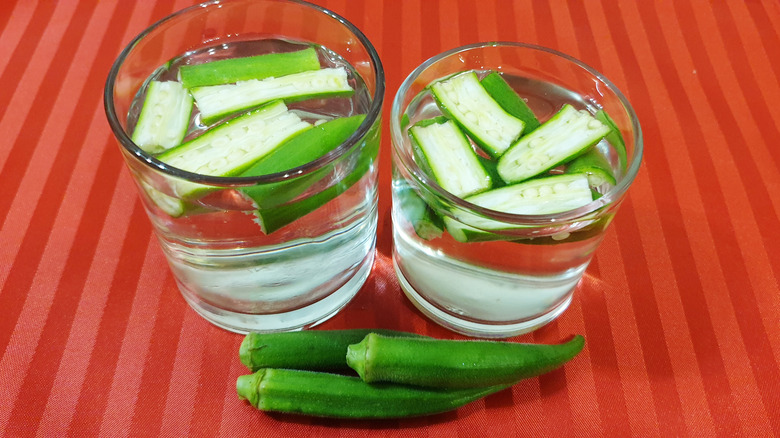Does Drinking Okra Water Provide Any Health Benefits?
In Southern Louisiana, gumbo isn't just a hearty soup but rather a representation of converging cultures. And no gumbo would be complete without okra. While gumbo relies on okra for the flavor and slimy thickness it adds to the beloved dish, many others can't stand the stuff for those very same reasons. But for the health conscious, abstaining from such a nutritious food item can feel like a betrayal of self.
For that reason, many people have turned to okra water — an infusion made from soaking raw okra pods in water — in hopes of attaining all of the benefits of eating okra without actually having to eat it. Containing seven out of the eight B vitamins, as well as vitamins A, C, and K, and nutrients like potassium, magnesium, calcium, phosphorus, zinc, iron, copper, manganese, selenium, and fluoride, okra is highly nutritious with the potential to do a lot of good in the body (per Arab News).
While okra is chock full of nutrients that can add to your health, is drinking okra-infused water just as beneficial? Let's find out.
The health benefits of okra
A 2018 study published in the Research Journal of Chemistry and Environment revealed that okra, also known as Abelmoschus esculentus, is rich in flavonoids and polyphenols, which have powerful antioxidant properties, protecting cells from cancer-causing free radicals. On top of that, okra is loaded with vitamins A and C, furthering its cancer-fighting capabilities (per WebMD). What's more, a 2014 study published in Biotechnology Letters found that lectin isolated from okra inhibits the growth of breast cancer cells by a whopping 63%.
In addition, the flavonoids and polyphenols in okra are effective in lowering blood sugar levels. A 2020 study published in Food Science and Technology discovered that when okra extract was fed to diabetic rats, it resulted in increased insulin secretion, as well as a reduction in blood glucose and lipid levels. Another 2019 study published in the International Journal of Pharmaceutical Sciences and Research found that when diabetic rats were dosed with okra extract, not only were lipid levels restored to normal levels, but it also contributed to weight loss.
While some people aren't a fan of the gel-like substance called mucilage, which gives okra its slimy texture, a 2018 study published in the International Journal of Food Science and Nutrition, discovered that during digestion, the mucilage in okra could bind to triglycerides and LDL cholesterol in the blood making it easier to eliminate from the body. In other words, reducing "bad" cholesterol levels makes okra an excellent defender of heart health.
Does okra water have the same benefits?
While WebMD points out that infused water can leech only some of the whole foods' vitamins and minerals, a 2019 study published in Jurnal Riset Kesehatan established that minerals like potassium, calcium, and magnesium, as well as vitamins A and C, can be effectively infused in water in potentially beneficial proportions. The experts at Best Food Facts also suggest that B and C vitamins are water-soluble, making them easily extractable when soaked in water.
However, much of the research on okra examines the benefits of okra and okra extract as opposed to okra-infused water (via Healthline). For this reason, there hasn't been enough research to determine the exact level of nutrients okra water contains compared to whole food.
Typically, infused okra water is made by soaking the raw fruit in water overnight. However, StyleCraze suggests that blending okra pods in water can produce a beverage similar in consistency to aloe vera juice, with more nutrients than a standard water infusion can contain.



